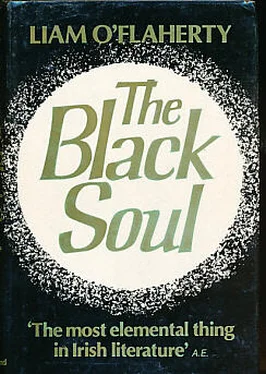The Stranger used to lie in his bed at night smoking and think, ‘Ah, how short-lived is happiness. Now everything is lost again. The devil take it.’ He felt sure now that the past few months had been a heaven of delight, untainted by the slightest sorrow, that he had been madly in love with Little Mary, and that the future had been pregnant with happiness. Now everything was changed and he blamed Little Mary for it. ‘She has driven that poor man mad,’ he would say to the ceiling. ‘She is driving me mad too. What is going to be the end of it?’ And he would wander off cataloguing all the most dreadful fates that could befall the three of them. But each night, before going to sleep, he would determine, with tears at the back of his eyes, to have an explanation with Little Mary the following morning, to get Red John to see a doctor and to go away to the mainland with Little Mary. And yet in the morning, somehow it was impossible to speak. There was the same sleepiness in the brain, the same irritation in the heart, the same silent downpouring of heat from the sun without. It was impossible to do anything with Little Mary fidgeting about, breaking a cup one morning, sweeping the dust from the floor in his face another morning, her face wet with tears another morning. And Red John always sat immovably by the hearth, twitching spasmodically and laughing at nothing.
‘Ah, something terrible is going to happen,’ the Stranger would say as he left the cabin. And yet, before he had gone far, he would sink into a melancholy yet comfortable torpor, where even the most dreadful prospect did not terrify him.
He no longer went to the pier at Coillnamhan. He was ashamed to meet the tourists who now crowded the pier and the beach and everywhere along the road from Kilmurrage to Rooruck. Their happy laughter (laughter of which tourists and priests alone are capable), their gay dress, made him shun them. So he said they were vulgar, and in order to be alone he went along the south to the Yellow Cliff, midway between Rooruck and Kilmurrage. It was the most deserted spot in Inverara in summer and the most beautiful because of its majestic solitude. There indeed the silence was so great, and the emptiness so vast, that one might dream of reading the meaning of the universe, staring at the sky or looking down along the faces of the sheer cliffs into the still sea.
At the summit of the Yellow Cliff was a niche cut by nature during some great storm, aeons before, into the crag in the shape of a chair without any legs. They called it Myles’s chair, after a peasant who fell down from it into the sea some hundred years before. He sat on that chair for hours at a time thinking, without moving a muscle. The perfect solitude, away from everything that even suggested men and cities and civilization, made the limbs as restful as the walls of the cliff itself. Nobody passed there excepting a solitary peasant woman who daily tended her sheep on the crags, and she merely shaded her eyes with her hand to look at him and went on in silence. The cliff stretched down from his feet, bulging in the middle so that he could not see its base. A circular bay stretched eastwards, locked by sheer cliffs, and the cliffs were intersected by three rows of cavernous slits, where rock-birds and seagulls lived and other birds with long red beaks whose names he did not know.
Sitting there his fears only made him happy. A great wave of delicious sorrow rose up within his breast, and he smiled and said: ‘Ha, it is worth while to be alive and be here. Just to sit here for a time and then die.’ And, inspired by his sorrow with a creative frenzy, he wanted to write a great poem about the cliffs and the sea. He felt that he knew something that nobody else knew, that he was scratching at the door behind which the secret of life lay hidden. His poem would be about that, not about the secret, but about the scratching. Nobody had ever even scratched before. He was assured of that when he recalled all that had ever been written about the sea or nature or life. It appeared superficial to him. ‘They never felt what I feel. I understand. I … I … I.’
But then what did he understand? Looking at the sea, trying to give voice to what he understood, he found that he knew nothing. There was a pain in his heart as if something moved within him, trying to come out, and yet nothing came out. It was impossible to write anything about the sea. It was too immense. It would laugh at him. He could hear it laugh. And then he would cast aside the idea of writing a great poem, saying, ‘Poetry is all very well for those who do not know the sea and nature. For those like myself, who know the sea and nature, poetry is trivial nonsense.’ Shrinking from everything that oppressed him, the world, Red John and Little Mary, he clung to nature, humbly, as if appealing to it for protection. He became intimate with every ledge and slit and boss and weather-stain on the cliffs, with every wave on the bay, with every rock that jutted from the water, with its red wet mane of seaweed floating around it. He even felt kinship with the fishes prowling in the depths. He believed in the existence of the mermaids and elfs and sea-horses with golden manes who were said to live in the caverns at the base of the cliffs, where the waves sounded at high tide like cargo shifting in the bowels of a ship during a storm. The tide coming in and going out was a living thing to him. He felt that he was a component part of this complex life, that he could rest in peace, that he was free from care and danger and sorrow, that even death could not touch him.
But when he left the stone chair and the shadows of evening were falling, reality pressed in on him as blinding and heavy as a dark night on a man lost in a forest. He met groups of girls walking along the cliff-tops flirting with the young men who were out fishing in their boats, calling to the girls and singing love songs at the tops of their voices, full of the joy of summer and of life. And he passed along, gloomily conscious that the only laughter of which he was capable was the harsh laughter of sorrow. A shapeless cloud gathered around his mind, and he became again conscious of the cabin and Little Mary and Red John who was mad. It seemed so insoluble and dry and parching, that problem that lay before him in the cabin. There were three lives so intricately bound together that there was no conceivable way of arranging things. And the fear that something dreadful was going to happen grew more vivid every evening. As he came within earshot of the cabin he always expected to hear the sound of wild weeping. And when he entered the dim kitchen and heard nothing in the silence he wished that he could blow it up with dynamite and finish the torture. It was terrible, waiting for he knew not what.
Then one evening, as he was coming along the cliffs wrapped in melancholy, he suddenly came upon Kathleen O’Daly, just at the foot of the slope, where the Hill of Fate dropped to the shore at Rooruck. She was sitting on a rock, reading a book, while her father lay on his belly some hundreds of yards to the west, just at the western angle of the island, shooting cormorants. She sat up when she heard his rawhide shoes swishing along the short slippery grass coming down the slope.
‘Hallo,’ she said. He stopped dead and saw her. She was the last person on earth that he wanted to meet just then, when he felt sure that everybody could read in his face the sordid and disgraceful story of his life in the cabin. But looking into her face for a fleeting moment as he replied to her salutation, he saw an expression in it that made him forget the cabin in a still greater horror. Her checks were flushed. The muscles of her neck, her whole body, in fact, trembled slightly. And her eyes stared steadily, softly into his without wavering. She wanted him. It flashed on his mind that she did, and for a moment he began to wonder what had he done to her to make her look at him like that. A violent repulsion seized him. He looked around as if seeking some means of escape, and he saw her father lying out on the extremity of the rock. He started perceptibly. ‘Sit down,’ she said slowly. He sat down, wondering what had come over her, or whether she was really Kathleen O’Daly, or whether he was suffering from a delusion. Surely she would not … He looked at her as if to reassure himself. And just then O’Daly fired at a cormorant. They both started and stared westwards at the little column of smoke that was rising vertically on the still air. They kept looking at it in silence until it vanished. Another five minutes and more they sat without speaking. Then Kathleen suddenly flung her book on the ground and stamped on it. ‘Oh, go away,’ she said, without looking at him.
Читать дальше












